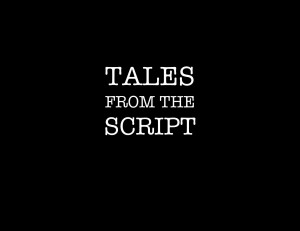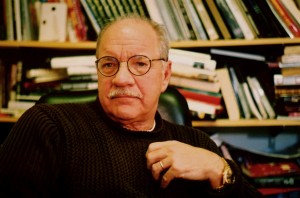Wed 10 Mar 2010
Script Doctors
Posted by Ethan under Film Review, NYC Film Critic
Comments Off on Script Doctors
Tales From the Script
Directed by Peter Hanson
Featuring Allison Anders, John Carpenter, Josh Friedman and William Goldman
***
Because the subjects profiled in the new documentary Tales From the Script, directed by Peter Hanson and co-written and co-produced by Paul Robert Herman, tell stories for a living, it shouldn’t be surprising that this behind-the-scenes look at the art and commerce of Hollywood screenwriting is filled with memorable yarns.
Take, for example, Josh Friedman’s recollection of a phone conversation between him and Steven Spielberg where he spent 20-minutes pitching his take on War of the Worlds to the director only to be told, “No, I don’t want to do that.” (Friedman was hired to write the script anyway, but was booted off before the movie went into production when Spielberg’s favorite ringer David Koepp came aboard to do a polish.) There are also great stories told by veterans like Halloween‘s John Carpenter and Taxi Driver‘s Paul Schrader, as well as relative newcomers like Watchmen‘s David Hayter, whose description of how he went from a go-fer on the first X-Men movie to writing dialogue for key scenes should inspire even the most cynical scribe.
But hands down my favorite tale comes from American Psycho‘s Guinevere Turner, who was handed the unfortunate (but lucrative) assignment of penning German schlockmeister Uwe Boll’s adaptation of the video game Bloodrayne. After missing her initial deadline, Turner banged out a screenplay she generously describes as a “nasty…scrappy little draft of a script” and sent it off to Boll, who praised it to the skies and instantly started filming. She didn’t hear anything about the movie again until shooting was complete, at which point the producer called her to say that the director didn’t exactly stick to the script. Instead of demanding that her name be removed from the credits, Turner attended the premiere and watched the entire movie, howling with laughter throughout. “It’s a $25 million movie and it blows,” she says with a big grin on her face. “It’s, like, the worst movie ever made.” Honesty in Hollywood–gotta love it.
A jack-of-all-trades when it comes to covering the film world–in addition to his documentary work, he’s also written several books about the movies, including a tie-in tome for this film–Hanson’s apparent goal with Tales From the Script is to give screenwriters the kind of valedictory treatment that cinematographers enjoyed in the marvelous 1992 documentary Visions of Light. The key difference between the two movies is that Visions of Light is able to present its subjects’ work directly to the viewer in a way that Tales of the Script simply can’t. The makers of that film didn’t have to just rely on Gordon Willis’ descriptions of how he shot The Godfather; they’re able to cut to clips from the film that illustrates exactly what he’s talking about.
Screenwriting is an entirely different craft, one where the results can’t be depicted in an inherently cinematic way. After all, nobody would want to watch Turner and Friedman sitting at their computers typing up a script for two hours. And simply cutting to a film clip isn’t necessarily the solution either because, as many of the scribes point out, the finished film doesn’t always reflect what was originally written on the page. Besides, it’s clear that Hanson and his collaborator Herman don’t have the same access to archival material that the makers of Visions of Light enjoyed. (That’s not entirely surprising since the American Film Institute was the primary backer of that picture whereas Hanson and Herman are taking the independent route.) As a result, there are only a handful of film clips and assorted still images scattered throughout Tales From the Script, which means the majority of the movie consists of talking-head interviews. It helps that most of the speakers are engaging, but the relentless sameness of the mise-en-scene does grow wearisome after awhile.
Funnily enough, the other area where Tales From the Script suffers is in its structure. Divided into short “chapters” the movie tackles a number of topics, from breaking into the business to dealing with demanding directors and actors, but these sections aren’t organized in an entirely cohesive way. It’s also unfortunate that the filmmakers decline to dig more deeply on some of the more interesting plot threads he uncovers, such as the career of Michael January, a writer who moved out to Hollywood with the hopes of hitting it big, but instead spent much of his career penning direct-to-video dreck like To Be the Best and Hostile Force. In fact, January’s story could be a movie in and of itself, one that’s much closer to the reality a lot of aspiring screenwriters face than, say, selling a screenplay for $2 million as Lethal Weapon‘s Shane Black–who is also interviewed here–famously did.
It’s nice to report that Tales From the Script compensates for some of these flaws with its impressive breadth and a welcomingly diverse cast of writers from wildly different backgrounds. For all their complaints about the studios, stars and screenwriting itself, everyone the filmmakers talk to loves movies and, more importantly, loves writing movies. Their enthusiasm for their jobs and the medium itself may motivate you to sit down and write your own screenplay or, at the very least, run out and rent a bunch of the films they’ve written.
Tales From the Script opens in New York on Friday and in Los Angeles on March 19th. The DVD will be released April 20 and the companion book is available now. Visit the official website for more information.




No Responses to “ Script Doctors ”
Sorry, comments for this entry are closed at this time.